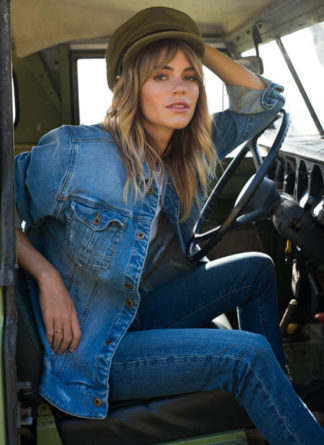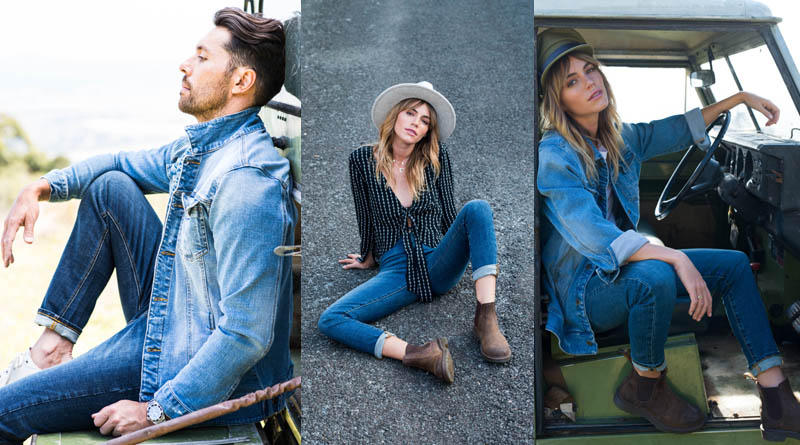Q&A: OUTLAND DENIM – JEANS CHANGING LIVES
Can the clothes we wear make a long-term difference to the lives of vulnerable people? Could our jeans help stop the injustice of human trafficking? James Bartle from Outland Denim believes the answer to both these questions is YES. And that’s why he founded his company …
Please tell us what you do:
I am the Founder and CEO of Australian based Outland Denim. We create premium, timeless wardrobe ‘heroes’ designed to create true, measurable, generational social change in the lives of vulnerable women and their communities.
What inspired you to create the Outland brand?
Outland Denim’s story began about 10 years ago when my wife and I saw the Liam Neeson movie Taken. While a fictional film, it was an introduction to an industry that exists today in 2019, where people are stolen and sold for profit; about 40.3 million people are caught up in modern slavery. As we began to research, we soon discovered the complexity of the problem and its prevalence all over the world; no nation is untouched. I had the opportunity to travel through Southeast Asia, where I saw what the problem looked like on the ground. We discovered that in addition to sex trafficking, trafficking for labour was also a common threat within vulnerable communities. We learnt that once a woman has been rescued and reintegrated into the community, a sustainable career path is vital for securing her future. Outland Denim was founded to offer that sustainable career path.
What are the issues that your range is helping to address?
The driving force behind Outland’s inception was the need to correct the atrocity of the $150 billion human trafficking industry. We set out to train and employ survivors of trafficking and sexual exploitation, and give them a sustainable career path within a safe, nurturing work environment sensitive to their needs. Since then we have expanded our social mission, welcoming to the Outland Denim team people with various vulnerabilities, including those at risk of poverty, unemployment, discrimination and re-trafficking. We provide transferable skills, a living wage, educational programs, the opportunity to progress within the company, and other life-enhancing opportunities that allow them the freedom to live, to save and to pave the way to a prosperous future.
How does Outland help the environment, people and wildlife?
Although generational social change was initially the driving force behind Outland Denim’s inception, it wasn’t long into researching and developing this business model that we discovered that there are injustices that exist all throughout the modern apparel supply chain. We now have a dedicated Social and Environmental Impact Manager who assesses our impact and the standards of our suppliers from the cotton farm all the way through to our couriers to ensure that the success of Outland Denim and the women we employ did not come at the expense of other people or the planet. Due to our unique social mission, we seek to align with other companies who are making a stand and a positive difference in the fashion industry.
We acknowledge that the use of cotton and dyes in the process of jean manufacturing results in a myriad environmental impacts. We are attempting to reduce the impact of our denim by sourcing it from Bossa, an organisation involved in the Better Cotton Initiative (BCI), which aims to increase the sustainability of cotton production through reducing the negative environmental and social impacts of cotton. It abides by the Global Organic Textile Standard (GOTS) and has ISO certifications in Energy, Quality and Environmental Management. Through sourcing from BCI, Bossa is reducing its environmental impact by ensuring that farmers are using the best practices in regards to water, fertilisers, chemicals and other resources. Bossa has also assisted Outland Denim with evidence supporting that fair wages are paid to their employees adequate to meet living costs in Turkey.
The use of toxic synthetic indigo dye poses a major threat to environmental and human health in and around garment manufacturing facilities. This is why we prioritise the use of natural indigo dyes for our denim. The use of natural vegetable dyes means that workers are exposed to less toxic chemicals and the likelihood or severity of water pollution is reduced, leading to an overall increase in the sustainability of our jeans.
The mining of metal for uses in zippers and studs for jeans can cause a multitude of environmental impacts that are felt for generations. Our supplier of zippers and studs, YKK, tries to reduce its environmental impact by creating zips from recycled materials. We also appreciate YKK for their social stewardship through the provision of: vocational training and educational support for young people; a childcare centre for utilisation by their Bangladeshi workers; free health examinations for employees and their communities; and equal opportunity for all employees. Other hardware you’ll find in our jeans such as buttons and rivets, are sourced from Timay and Tempo, an Oeko-Tex Standard 100 certified company. This standard means that Timay and Tempo facilities are environmentally friendly and tested for the use of harmful chemicals, demonstrating commitment to human and environmental health and safety.
 Coats is Outland Denim’s supplier of thread and invests much time and money into creating socially and environmentally sustainable workplaces and communities. Coats is safeguarding environmental health by: being part of the ZDHC Initiative; reducing greenhouse gas emissions (those responsible for warming the atmosphere) by 18 per cent over the past three years; increasing usage of biofuels to replace fossil fuels; controlling effluent water in accordance with local legislation as well as their own global standards; and being ISO 14001 ‘Environmental Management Systems’ certified.
Coats is Outland Denim’s supplier of thread and invests much time and money into creating socially and environmentally sustainable workplaces and communities. Coats is safeguarding environmental health by: being part of the ZDHC Initiative; reducing greenhouse gas emissions (those responsible for warming the atmosphere) by 18 per cent over the past three years; increasing usage of biofuels to replace fossil fuels; controlling effluent water in accordance with local legislation as well as their own global standards; and being ISO 14001 ‘Environmental Management Systems’ certified.
Viet Thang Corporation is the Vietnam-based supplier of the pocket liners in our jeans. It is a decorated company awarded with many certifications, such as the OEKO-TEX® Standard 100, ISO 9002 and ISO 14001. Oeko-Tex and ISO are both independent certification companies whose certifications are globally recognised for excellence and quality. Oeko-Tex (Swedish Chemicals Agency) certification ensures that there are no harmful, illegal or legally restricted substances being used within any stages of textile development. ISO9002 is a quality assurance certification. This means that customers can be assured that Viet Thang Corporation is adhering to the eight core quality principles that ensure companies continually improve their practices, have a strong focus on customers, and hold mutually beneficial relationships with suppliers. Environmental management is the focus of ISO14001, which pledges companies to measure and continually improve environmental impact.
Packer Leather, the supplier of our brand patches, is a fifth-generation, family owned leather producer in Queensland, Australia. The Queensland Government has awarded Packer for their clean processes and environmental stewardship. Packer Leather received Gold, the highest rating available, by the Leather Working Group for their sustainable environmental business practices. Adhering to European restricted substance lists, recycling 40% of water used, utilising solar and significantly reducing the consumption of natural gas and release of CO2, Packer were the natural choice for Outland Denim patches.
Outland Denim’s chosen power supplier for our Australian headquarters is Powershop. The company, Australasia’s largest 100% renewable generator, is certified carbon neutral under the Australian Government’s National Carbon Offset Standard program, and was ranked Australia’s greenest power company by Greenpeace for two years running. All Powershop energy used by Outland is certified 100% carbon neutral.
Print Together, who produce our stickers and cloth bags, are focused on saving the world’s virgin rainforests, home to amazing biodiversity and carbon stores, through using only post-consumer recycled paper in their products. Post-consumer waste is paper materials that have been used for one purpose, such as a juice container or workbook, that is then recycled into a new form fit for another purpose. In conjunction with using recycled paper, Print Together uses natural vegetable dyes on its products; this ensures there is less chemical pollution being discharged into the environment and makes re-recycling those products better as no harsh chemicals are needed to break down the inks.
The Duchess of Sussex (formerly Megan Markle) was spotted wearing your jeans – what difference has that made to your business?
You cannot put a price on the brand recognition nor the credibility that the Duchess is able to bestow on a small, socially oriented enterprise such as ours. When you think about the fact that what we try to do with Outland is imbue our staff members in Cambodia with a sense of dignity in their work and their value as human beings, a quiet, dignified Royal endorsement such as this is incredibly helpful. Our staff can’t quite believe a Duchess is wearing their jeans. Importantly, the greatest success that has come from the “Markle Effect” for Outland Denim, is the 30 new seamstresses that we have been able to employ in our Cambodian production house. So, in terms of growing our business exponentially, Meghan has enabled us to do this in a very tangible, immediate way.
What next for Outland?
We are excited to introduce our debut jackets, the Harper and the unisex Smith jacket, our first women’s shorts, the Charlie and Emmy, as well as tonal renditions of our original Harriet and Isabel skinny jeans. In 2019 we’ll be welcoming a new cut to the men’s range, the straight-leg Eddie jean, as well as an increased offering in the crowd favourite Ranger and Dusty cuts. In the women’s range we will also be releasing our first skirt named Florence and statement seasonal washes such as White and Patchwork.
Where can we find out more in UK?
We look forward to bringing Outland Denim to the UK in the first half of 2019, but in the meantime our denims are available for pre-order through our website, www.outlanddenim.co.uk.
Facebook: /outlanddenim
Twitter: @outlanddenim

